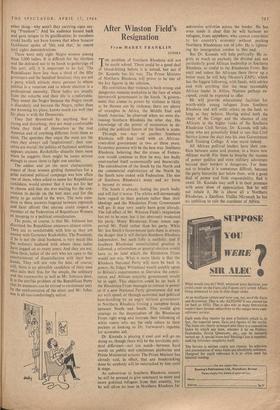After Winston Field's Resignation
From HARRY FRANKLIN
LUSAKA
rr HE problem of Southern Rhodesia will not I be easily solved. There could be a good deal of blood-letting before it is solved, but not if Dr. Kaunda has his way. The Prime Minister of Northern Rhodesia will prove to be one of the key figures in the solution.
His conviction that violence is both wrong and dangerous remains unshaken in the •face of white herrenvolk government in the South. 'A govern- ment that comes to power by violence is likely to be thrown out by violence; there are plenty of examples in Africa, the Middle East and South America,' he observed when we were dis- cussing Southern Rhodesia the other day. His knowledge of the power of economics in de- ciding the political future of the South is acute.
Through one way or another Southern Rhodesia will find itself with an African- controlled government in two or three years. Economic pressure will be the best way. Southern Rhodesia, believing that the cream of Federa- tion would continue to flow its way, has badly overreached itself economically and financially. The subsidisation of the South by the North and the commercial exploitation of the North by the South have ended with Federation. The size of Southern Rhodesia's army and air force is beyond its means.
The South is already feeling the pinch badly and will feel it worse. The whites will increasingly have regard to their pockets rather than their ideology and the Rhodesian Front Government will go. It may very nearly have gone already. The full effect of Mr. Winston Field's resignation has yet to be seen, but it has obviously weakened his party. Many Rhodesian Front voters sup- ported Mr. Field rather than his party. While Mr. Ian Smith's Government lasts there is always the danger that it will declare Southern Rhodesia independent, but such folly is unlikely; and if Southern Rhodesian constitutional practice is followed, a referendum or general election would have to be held which the Rhodesian Front would not win. What is more likely is that the Rhodesia National Party will soon be back in power. Sir Edgar Whitehead would quickly agree to Britain's requirements to liberalise the consti- tution and African majority government would be in sight. This objective could be set back if the Rhodesian Front manages to remain in power or if anew National Party government did not act with speed, or through economic and political ham-handling by an angry African government in Northern Rhodesia forcing a complete break between North and South. This would give courage to the desperadoes of the Rhodesian Front right wing and increase their following of white voters who see the only solace to their pockets in looking to Dr. Verwoerd's republic for economic aid.
Dr. Kaunda is playing it cool and will go on doing so, though there will be the inevitable poli- tical difference—not too much—between hard words on public and conference platforms and Prime Ministerial actions. The Prime Minister has already said, in effect, that any headcracking done by anybody will be outcracked by him until it stops.
As subversion in Southern Rhodesia mounts he will be pressed to give sanctuary to more and more political refugees from that country, but he will allow no base in Northern Rhodesia for subversive activities across the border. He has even made it clear that he will harbour no refugees, from anywhere, who cannot contribute to his country's economy without pushing Northern Rhodesians out of jobs. He is tighten- ing his immigration cordon to this end.
But Dr. Kaunda will help politically. He re- grets as much as anybody the divided and not particularly good African leadership in Southern Rhodesia, so useful to the Rhodesian Front. But until and unless the Africans there throw up a better man, he wilt help Nkomo's ZAPU, which has the biggest following, with funds, with advice and with anything that the most reasonablq African leader in Africa, Nyerere perhaps ex- cepted, could be expected to offer.
He will provide educational facilities for worth-while young refugees from Southern Rhodesia and will settle others on the land, so long as they behave. Having noted both the chaos of the Congo and the absence of any Africans in the higher ranks of the Southern Rhodesian Civil Service, Dr. Kaunda will take some who are potentially fitted to run that Civil Service (come the day) into his own Government Staff Training College. A wise move indeed.
All African political leaders have their con- flicts between sense and incense, in a brave new African world. For them to breathe the incense of power politics and even military adventure beyond their borders is dangerous. For them not to breathe it is sometimes difficult, because the party hierarchy just below them, with a good deal of power and little responsibility, find it sweet. Dr. Kaunda may sniff it in their presence with some show of appreciation. But he will not inhale it. He is above all a Northern Rhodesian, a Zambian. Unlike Nkrumah he has no ambition to rule the continent of Africa.


































 Previous page
Previous page